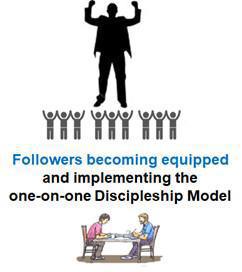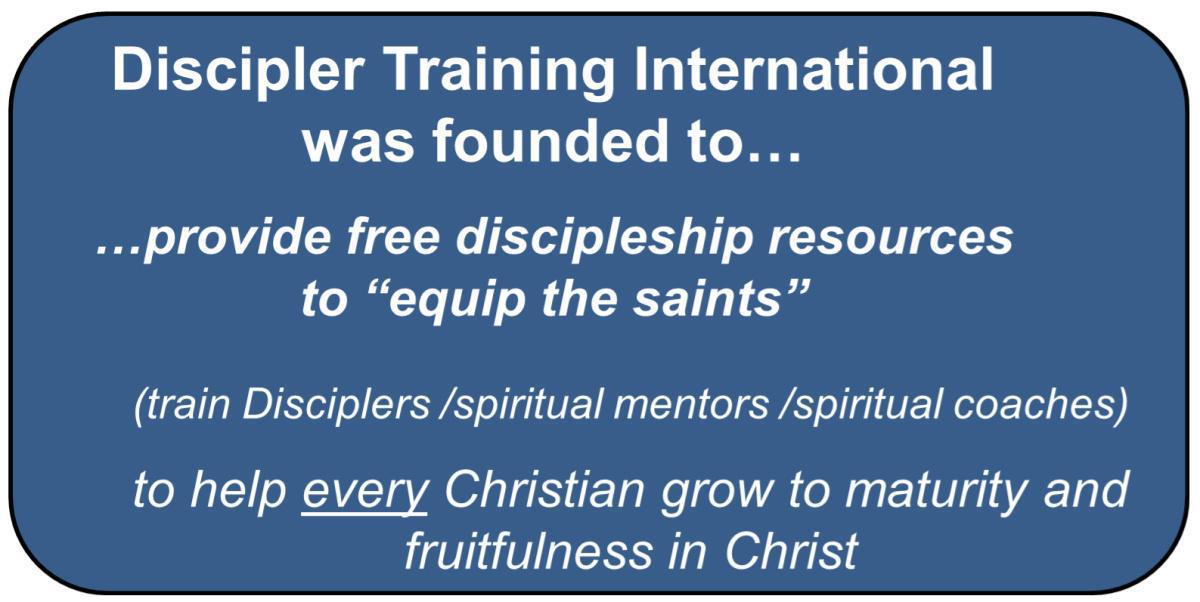How do we help Christians become LIKE their master and King, Jesus? What’s the biggest challenge to this happening consistently in the local church?
THE CHALLENGE: Expectations in a Typical Modern Church Congregation
-
Followers usually feel they are not adequately qualified and equipped to meet the needs of new believers and often think it’s the Pastor’s / Leaders’ role.
-
Pastors / Leaders are often perceived to be “trained” to disciple others but don’t have the necessary time to devote individually to each new believer.
God designed the Church as a “Body”, intending that the members of the body be interdependent and share responsibilities and service initiated and directed by the Holy Spirit to accomplish His purposes.
1 Corinthians 12:28-31 Here are some of the parts God has appointed for the church: first are apostles, second are prophets, third are teachers, then those who do miracles, those who have the gift of healing, those who can help others, those who have the gift of leadership, those who speak in unknown languages. Are we all apostles? Are we all prophets? Are we all teachers? Do we all have the power to do miracles? Do we all have the gift of healing? Do we all have the ability to speak in unknown languages? Do we all have the ability to interpret unknown languages? Of course not! … (NLT)
"God never intended that a special category of believers (leadership) should carry the entire load, but rather the responsibilities of service should be spread across the Body.
If discipleship simply means “the presentation of biblical truth,” then leaders perceive that their responsibility is to preach that message, expecting each believer to allow the Holy Spirit to apply those truths to their own lives.
However, since most newer believers are unfamiliar with how to communicate and cooperate with the person of the Holy Spirit, they will flourish and mature more quickly if somone personally helps them understand how to cooperate with the Holy Spirit in their personal spiritual development.
In addition, many churches attempt to develop “teachers” rather than “disciplers” and to focus on those who seem to have the “gift” for teaching. Since teaching is a gift of the Spirit, we must conclude that not all will have that gift.
But discipling is not a gift. Therefore, while we should only expect a few believers to become teachers, almost all believers should be seen as potential disciplers.
The next challenge is that many churches convey that seminary or Bible school training is needed to present God's Word correctly. Certainly God has used such training in the spiritual development of many leaders, but does that mean that those who don’t have that training are not qualified at all? And is it realistic to expect the typical Christian to have such training before God can use them to come alongside others?
A SOLUTION: Implement a Better Model by Equipping ALL Faithful Believers
Ephesians 4:11-16 And He personally gave some to be apostles, some prophets, some evangelists, some pastors and teachers, for the training of the saints in the work of ministry, to build up the body of Christ, until we all reach unity in the faith and in the knowledge of God’s Son, growing into a mature man with a stature measured by Christ’s fullness .
Then we will no longer be little children, tossed by the waves and blown around by every wind of teaching, by human cunning with cleverness in the techniques of deceit. But speaking the truth in love, let us grow in every way into Him who is the head—Christ. From Him the whole body, fitted and knit together by every supporting ligament, promotes the growth of the body for building up itself in love by the proper working of each individual part.
These verses clearly state that the role of Leaders is to “equip the saints” (train them in the work of ministry). That would include discipling / spiritually mentoring others. This can be done in corporate training gatherings or modeled in intimate one-on-one relationships.
-
The role of the “saints” / followers is to have a surrendered attitude and learner’s disposition to continue to grow and to be trained to mentor others.
-
THE RESULT should be that personal discipleship / one-on-one mentoring is the norm rather than the exception. The expectation is that every believer is in the process of being discipled or discipling others.
The ultimate goal is spiritual maturity, spiritual fruitfulness, and spiritual reproduction of each believer individually, and of the Church body as a whole, which leads to church growth through multiplication.
The DTI Mission Statement is based on Colossians 1:28-29 where Paul states, We proclaim Him, warning and teaching everyone with all wisdom, so that we may present everyone mature in Christ. I labor for this, striving with His strength that works powerfully in me.
Paul’s passion was to help every believer to reach the level of spiritual maturity that God has intended.
CONSIDER the free resources on our DTI website for equipping believers to spiritually mentor others:
-
Core Resource: A Tool for Personal Discipleship can be used:
-
In a one-on-one mentoring relationship (or one-on-two)
-
In group corporate study
-
For personal study and growth
-
In training faithful believers to mentor others, helping to identify gaps in their spiritual understanding
-
-
How to access the Tool (curriculum)
-
Available to download and print in English, Spanish or Mandarin on our website. www.disciplers.org
-
Available as an App for mobile devices in English or Spanish on our website.
-
-
Plus videos, Implementation Guide, Facilitation Guide, and more.
If God’s intention is for believers to become spiritually mature, then why are so many believers immature?
W. Edwards Deming said “Every system is perfectly designed to get the results that it does.”
The above statements should motivate all church leaders to honestly analyze the system they are implementing, and look to the Lord for His wisdom and direction as to what changes need to be made in order to produce Biblical results. We suggest that many churches are not following the model Paul laid out in Ephesians 4:11-16.
What follows is a model churches can use to assist in implementing what Paul said, beginning with equipping faithful men and women to come alongside newer believers to help them grow.



